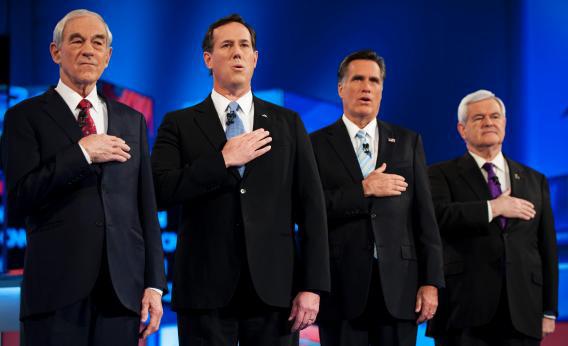The only clear winner from the unconvincing round of presidential primaries known as “Super Tuesday” this week was the man Republican candidates are fighting tooth-and-nail to oppose in November.
The numbers indicate that Mitt Romney, the on-again, off-again frontrunner in the Republican primaries, took the lion’s share of delegates at stake Tuesday, including a hair’s breath win in the important industrial state of Ohio.
But he continues to fail to draw blue collar workers or land the knock-out punch on his rivals that must come soon if Romney is to navigate the long, uncomfortable migration from the right side of the political spectrum back to the vote rich center. His desperation is showing in his plea for mercy from Gingrich and Santorum, asking them to drop out for the good of the GOP. Good luck with that, Mitt.
This left turn ahead for Romney – which can only start when he’s assured of the 1,144 delegates he needs to win the nomination – will require him to back away from some of the more contentious social statements he made during the primary campaign, particularly his strong opposition to abortion rights and contraceptives (the former supported by, the latter employed routinely, by a majority of Americans), immigration reform (which the growing Latino population demands) and mortgage relief (which Romney prefers to leave to the market). This is an enormous challenge - one I do not think can be navigated.
Nor has his casual defense of capital gains tax rates that are generally half that of income tax rates played well with the political center. Even his former private equity colleagues are angry at the ham handedness - evidence this piece ’Thanks Mitt!’ - in the Financial Times.
Add a somewhat wooden campaign style, and the wild card of his Mormon faith, rand it all adds up to a freight car’s worth of baggage.
In contrast, Barack Obama, while hardly endowed with insurmountable advantages, has run a savvy “Rose Garden”* campaign to date, essentially a non-campaign that allows him to appear presidential while macro indicators generally move his way.
Friday’s jobless numbers are expected to show some further incremental improvements, and business confidence and even housing construction has picked up in the past month. With the circular firing squad that is the Republican primary contest rolling on, the president has little reason to dust off his own considerable campaign skills, and instead can focus on building a financial war chest for the fall.
The Iranian Candidate
If there is one fly in this otherwise sweet ointment for Obama, it is Iran. Ironically, in a campaign year that assumed deep foreign policy fatigue among voters as the wars of 9/11 wind down, the prospect of another Middle East conflict stands as the most likely source of problems for Obama as the campaign moves toward a two-man general election in the fall.
GOP candidates have piled on gleefully with hawkish statements that portray Obama as timid in the face of Iran’s alleged nuclear weapons program, rhetoric that has driven oil prices to heights which could, eventually, derail the modest recovery.
Since Obama stood fast on the need for further diplomacy during the visit of Israeli Prime Minister Benjamin Netanyahu this week, the US likely has told Israel it will not support an Israeli strike at this juncture – and the current administration has no appetite for such a strike unilaterally. Indeed, reports emanating from Obama-friendly think tanks – those prone to feeding the middle and senior ranks of his administration’s foreign policy experts – sport titles like “Living with a Nuclear-Armed Iran,” and “How the United States Can Contain a Nuclear Iran.”
Not Dead Yet
Currently, in his race to capture the GOP standard, Romney has 404 delegates, with former Pennsylvania Sen. Rick Santorum second with 161 and Newt Gingrich, the former House speaker, third with 105. Gingrich and Santorum each captured states in Tuesday’s contests: Romney took Alaska, Idaho, Massachusetts, Ohio, Vermont and Virginia. Santorum won three: North Dakota, Oklahoma and Tennessee. Georgia, which Gingrich represented for two decades in Congress, stayed loyal to him. Ron Paul, also still in the race with 67 delegates, won nothing Tuesday.
For all the fraternal blood drawn by Republicans, however, polls indicate the tepid recovery and lingering doubts among non-affiliated centrist voters – the big prize in any US presidential election – about what Obama would do in a final, second term – unfettered by the need to run for reelection – have kept Romney in the hunt. Latest polls show Obama a clear favorite, but not by an insurmountable gap. The latest Wall Street Journal/NBC News poll gives Obama a six point lead.
This, of course, is fodder for television pundits. Does the relatively small gap represent a miraculous showing for Obama, who inherited the worst economy since the Great Depression and hasn’t really lifted a campaign-oriented finger yet? Or is it miraculous that so many voters, after what they’ve seen so far in what can only be described as an atrocious primary season, is still plumping for Romney.
There’s no scientific answer to that question. But I see Obama winning – 53 – 47 – in November, but also losing the Senate in the process. Either way, the real winner is gridlock, and Moody’s, Fitch and S&P will be sharpening their knives anew.
Michael Moran is Director, Editor-in-Chief of Renaissance Insights. Follow him on Twitter, or pre-order my book, “The Reckoning: Debt, Democracy and the Future of American Power,” coming in April from Palgrave Macmillan.
